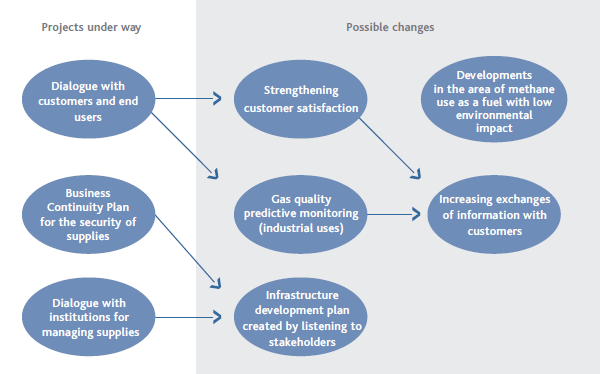Providing services is the main process through which Snam intends to satisfy its service obligations in each one of the businesses in which it operates, in line with the corporate mission and strategy. “Core” activities are defined as those characteristic of Snam’s business, such as natural gas transportation and dispatching, regasification of liquefied natural gas, and natural gas distribution and storage. The process of marketing core services sets itself the objective of seeing to business relations with users of the gas system, contract development and management, commercial management of user requirements, commercial planning and balancing, and billing for services provided.
PROVIDING SERVIC E – SUMMARY CHART

For a company such as Snam, ensuring service quality, reliability and continuity means implicitly generating social value. The Company, through a process of safeguarding its business and its primary processes, ensures normal living conditions for the Italian people. Snam was among the first companies in the gas sector to equip itself with a Business Continuity Plan, a model of structured management of possible crises. With this plan, the Company invests in protecting its assets, i.e. in protecting service to the community, through synergies with other stakeholders. The Business Continuity Plan provides for mapping all possible risks and implementing a business impact analysis with respect to all corporate processes, then focusing on the operational continuity of critical processes.
The security of energy supplies is an imperative for Snam, precisely because, due to the sector’s peculiarities, the concept of “business continuity” coincides with that of “social continuity”. Snam’s infrastructure, along with a large part of the investments proposed from the standpoint of a European market, is aimed at ensuring a secure energy supply for the country.

Snam has developed many tools and opportunities for dialogue and communication in support of the main stakeholders. Specifically, to aid service quality, the Company has prepared a pilot project for predictive measurement of gas quality and for web transmission of the respective specifics in real time to the customer, particularly for industrial targets that need gas quality to be constant; for some end customers, in fact, operational problems could occur in the event of a variation in the quality of continuous gas supply.
In addition, Snam has begun a process of bolstering customer satisfaction survey activities, which will include meetings dedicated to customers, both (upstream) prior to the preparation of the survey itself and (downstream) for giving out the final results. Customer satisfaction surveys will be a tool for further developing dialogue with customers, with a view to consolidating relationships and managing any problems in real time. If significant new changes to contractual terms should become necessary in the future, the Company could evaluate the possibility of holding prior structured meetings with customers to explain to the market the meaning of the changes, which often derive from unilateral decisions by the authorities (e.g. amendments to the Network Code), and to gather requests. Among the future projects being evaluated is the development of a relationship of mutual exchange with customers in the provision of metering data to increase commercial capacity and informational symmetry. The development of gas telemetering, a direction that will be pursued soon in Italy, could in fact generate new opportunities.

Snam’s desire to create shared value, as well as engaging in systematic dialogue with customers, can be represented by relations with institutions. In light of this, some planning aspects could be reinterpreted as an opportunity for discussion and coordination with public authorities and could be designed with a participatory approach, involving some key stakeholders in a collegiate manner.
Lastly, as the final project directive, we may consider the launch of a feasibility study for the use of liquid methane (LNG) for automotive use, in specific contexts and in fragile ecosystems. The positive impacts would be undeniable: greater efficiency and decreased pollution, possibly starting with some pilot projects.



